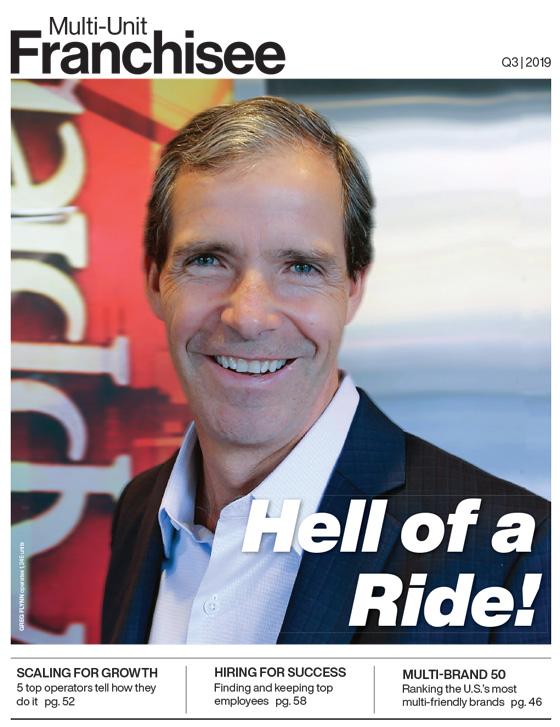Best in Class: Franchising Trains the Unskilled for Upward Mobility

Franchising has been dragged into the minimum wage debate--and for way too long has been associated in the public eye with dead-end jobs. Why do we continue to allow this to happen?
Today's income equality debate is really about wealth, not income. The franchising community hasn't seen clearly just how well it is solving the problem. We need to fix that.
We now have more millionaires in the U.S. than Sweden and Portugal have people. Since the Great Recession, the number of people in the $1 million to $5 million group has doubled, and there now are more than 10 million people at the low end of the millionaire group (which excludes primary residences). We should be celebrating that capitalism works, and that this many people have achieved such a status.
The problem is that the growth rate of wealthy households continues to outpace middle-class growth rates. The real issue is how to accelerate the middle-class growth rate, not attack the wealthy growth rate, which inevitably involves taxes. As Winston Churchill said: "We contend that for a nation to tax itself into prosperity is like a man standing in a bucket and trying to lift himself up by the handle. You cannot tax a nation into prosperity, but neither can you 'not tax' a nation into prosperity."
How do we create prosperity? The usual responses are business and job creation. What about something more fundamental? How about upward mobility? Unemployment is at all-time lows. We have more than 7 million job openings. Those who advocate for higher minimum wages and unionization to solve the income/wealth gap are misguided. Capitalism works. Those 7 million job openings are substantially non-minimum wage positions. The missing ingredient? Skills. If you have a skill that employers want, it is almost guaranteed that the minimum wage debate isn't about you. It's about a very large pool of unskilled labor candidates in a shrinking pool of unskilled positions.
Almost daily we read about another company, or even a whole industry, where technology is replacing repetitive jobs. Perhaps that is why the franchise business model is so often synonymous with minimum wages. Franchising hires so many unskilled employees. That should be a good thing. You're helping to solve a big economic issue, offering someone the first step in their careers. Instead, you get attacked as not paying living wages to a pool of unskilled people who lack any sort of upward mobility.
I find that ironic. Since when did an entry-level job get defined as a position that should be able to support a family? Isn't the concept of upward mobility to start with any job that offers the possibility of growth into the American Dream? If the standard for entry-level jobs is to solve a social issue like supporting a family, we need to change the entire educational system to prepare young people better--and know we are forcing employers to substitute technology for every job that is below that wage level. How will that help? It simply won't.
The pathway to upward mobility is to gain job skills at the entry level. Our educational system can talk about how you should handle customer service. The only way to learn it is to practice it in a job. That can only be done when an entry-level job comes with fundamental skill development. I think I just defined franchising from an employee's perspective.
Franchising offers millions of Americans a first job, hundreds of thousands upward mobility and careers, and thousands business ownership. More important, it offers those millions the start toward upward mobility. How? Every franchise job comes with training--training that is far more valuable than schooling is in determining upward mobility.
Throughout service-based industries, almost every employer hiring entry-level candidates would choose a candidate with franchise experience over one with more schooling on their resume. Why? Because employers know these candidates received valuable training in relevant areas, such as customer service, responsibility, teamwork, POS/computer use, and so forth.
Upward mobility is an opportunity, not a right. How do we present the franchise business model as the best upward mobility chance the unskilled labor market has? As multi-unit operators, you're at the top of the franchise food chain and should be revered by labor policy leaders and experts as both job creators and upward mobility creators.
If the franchise business model really is doing both, doesn't it just come down to a marketing and perception issue? It's time for franchising to reframe the debate and take credit for building so many American Dreams. We've allowed others to pigeonhole franchising into a dead-end job mindset. It's time to show what the model really is doing for America. Where are the marketing wizards when we need them?
Darrell Johnson is CEO of FRANdata, an independent research company supplying information and analysis for the franchising sector since 1989. He can be reached at 703-740-4700 or [email protected].
Share this Feature
Recommended Reading:
FRANCHISE TOPICS
- Multi-Unit Franchising
- Get Started in Franchising
- Franchise Growth
- Franchise Operations
- Open New Units
- Franchise Leadership
- Franchise Marketing
- Technology
- Franchise Law
- Franchise Awards
- Franchise Rankings
- Franchise Trends
- Franchise Development
- Featured Franchise Stories
FEATURED IN

Multi-Unit Franchisee Magazine: Issue 3, 2019

$1,000,000
$350,000





 The multi-unit franchise opportunities listed above are not related to or endorsed by Multi-Unit Franchisee or Franchise Update Media Group. We are not engaged in, supporting, or endorsing any specific franchise, business opportunity, company or individual. No statement in this site is to be construed as a recommendation. We encourage prospective franchise buyers to perform extensive due diligence when considering a franchise opportunity.
The multi-unit franchise opportunities listed above are not related to or endorsed by Multi-Unit Franchisee or Franchise Update Media Group. We are not engaged in, supporting, or endorsing any specific franchise, business opportunity, company or individual. No statement in this site is to be construed as a recommendation. We encourage prospective franchise buyers to perform extensive due diligence when considering a franchise opportunity.